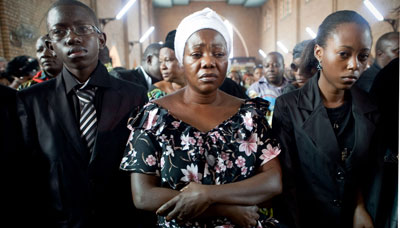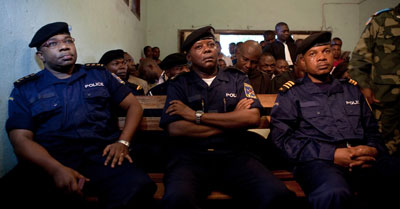Who killed Floribert Chebeya, the president of the leading DRC human rights group La Voix des Sans Voix, and his driver, Fidèle Bazana, in June 2010 in Kinshasa? A few runaway police officers, according to the military tribunal that judged the case and issued its sentences one year later. A few bad apples, who acted on their own, without any order from their hierarchy.
Although four of the eight indicted policemen were condemned to the death penalty and one to life imprisonment for the murder of Floribert Chebeya, the victims’ widows were stunned by the verdict. Their lawyers were outraged. Virtually no one in the DRC or the international community believed that justice had been done.
Neither did Thierry Michel. A prize-winning independent Belgian journalist and film producer, Michel has carried his camera for decades all around the Democratic Republic of Congo, exposing the megalomaniac and brutal regime of former President Mobutu Sese Seko (who ruled from 1965 to 1997), filming the daily life and struggles of the population, capturing the majesty of the Congo River, and investigating corruption and oppression in the Katanga mines.
He has paid a price for his doggedness: in 1993 he was arrested by thugs of the Mobutu dictatorship, jailed, and expelled from the country. Many officials today continue to see his passion for Congo as a threat to the web of corruption and arbitrary violence that sustains the current regime. “I am regularly arrested and interrogated by the police, the military, or the intelligence services,” he told CPJ. “But I also know that as an international journalist I can do things that would be too risky for local reporters.”
His new documentary, “L’affaire Chebeya, un crime d’Etat?” (The Chebeya affair: A state crime?) will not endear him to Joseph Kabila’s government, which had been expected to bring some democracy and respect for human rights following elections in 2006. “In fact, Chebeya’s murder marked the end of the democratic hope raised by the 2006 elections,” Michel said Thursday in Brussels.

Following investigations at the crime scene and the court proceedings, interviewing the victims’ widows and their lawyers, Michel’s cameras reconstruct what happened on June 1, 2010, when Chebeya and his driver went to the Kinshasa police headquarters to meet with General John Numbi, the chief police inspector, and disappeared. Chebeya’s bruised body was discovered the next day in his car in a staged position that sordidly implied that he had died during sexual intercourse. Bazana’s body was never found.
The film records the many flaws of the investigation, the disappearance of evidence, the failure to detain key suspects and a cascade of false statements. But above all it exposes Congo’s “deep state” — the murky interaction between the security services, the police, and the judiciary that guaranteed the impunity of those that ordered the crime. “Truth is at the bottom of the well,” Thierry Michel said. “The trial was a tragedy for the Congolese society but it was also in a theatrical sense a comedy.” By closing in on the indicted policemen — as well as on their superiors, who were summoned to the bar as “renseignants” (witnesses not under oath) — Michel’s cameras reveal their coarseness but also apparent indifference, as if they knew they would eventually enjoy impunity.
Michel describes the attempts of some Congolese officials to approach the truth, but he also sketches a heavy atmosphere of raw manipulation and intimidation. “The camera can act as a lie detector,” he said. “And there have been many lies during this trial, with probably the revelation of a state lie. The trial was locked from the start to the extent that the main suspect, John Numbi, could not be prosecuted because he was a three-star general, effectively shielding him from the reach of military justice.”
Chebeya – the name of whose human rights group, La Voix des Sans Voix, means “The voice of the voiceless” — had been a resolute adversary of Mobutu. And he was a constant thorn in the side of the Kabila dynasty –Laurent-Désiré Kabila ruled from 1997 until his murder in 2001, when his son Joseph succeeded him — investigating abuses, exposing massacres, and mobilizing people. Over the years he became one of the most vocal and well-known human rights defenders in the DRC. The killing of such a prominent figure could not be swept under the carpet of total impunity that suffocates the country. As Michel’s film makes clear, the outraged reactions of DRC’s civil society and of the international community — ambassadors, NGOs — were instrumental in forcing the authorities to hold a trial. Although the trial was deeply flawed and protected the alleged sponsors, it was unprecedented. “Under Mobutu it would never have taken place,” Michel said. “Now there is vibrant civil society, critical and inquisitive journalists. The Congolese society has matured.”
Michel dedicates his film to four slain DRC journalists: Serge Maheshe, Franck Ngyke Kangundu, Bapwa Mwamba, and Didace Namujimbo. “Now unfortunately I have to add two other names to the list: Patrick Kikuku and Kambale Musonia,” he told CPJ. “The press is supposed to be the guardian of the rule of law and in DRC it has paid a heavy price.”
But “L’affaire Chebeya. Un Crime d’Etat?” does not end on a note of desperation, because it highlights the awakening of a Congolese civil society that refuses to be intimidated and dares to speak truth to power. The film gets beyond the somber depiction of an arbitrary and brutal state. It shows that the “voiceless” who Chebeya had fought so much to defend are standing up. The victims’ widows, Annie Chebeya and Marie-Josée Bazana, the lawyers that took up their husband’s cases, the demonstrators in the streets of Kinshasa, Christian communities, and a few crusading journalists have been using all the interstices of Congo’s deeply flawed justice system to seek the truth and attain justice.
They are keeping a close watch on the case, not only to prevent the convicted policemen from winning the appeal that they have submitted in June 2011, but also to ensure that those convicts who have fled the country – three of them were convicted in absentia — are arrested. They campaign for complete reform of the country’s judiciary, in order to stop the cycle of impunity that feeds violence against journalists and human rights defenders.
The documentary has become a key tool in this fight for justice. It is currently being shown in European cities, where it serves as a basis for panel discussions on the state of human rights in the DRC. In July, Michel will tour the Democratic Republic of Congo for three weeks to hear the “voice of the voiceless” that Floribert Chebeya vowed to protect and empower.
